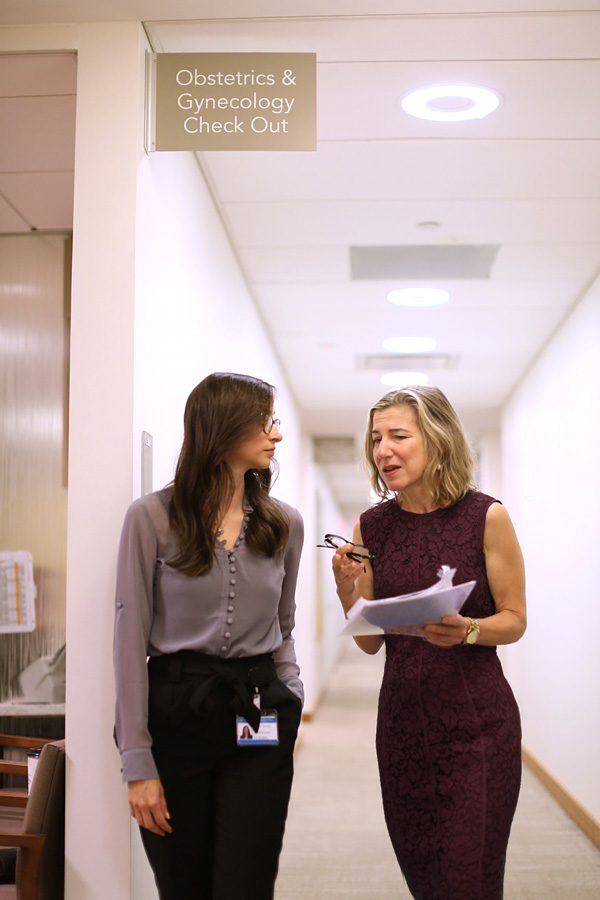The best time to get a child’s life off to a solid start begins months before their birth. That’s why every pregnant woman’s obstetric visits feature a set of routine wellness checks—fetal heart check, urine screening, weight and blood pressure.
Dr. Monk, professor of Medical Psychology in the Departments of OB/Gyn and Psychiatry at Columbia University Irving Medical Center, directs the department’s Perinatal Pathways Research Laboratory, where a team of researchers focuses on the earliest influences on children’s development by connecting perinatal psychiatry, developmental psychobiology and neuroscience to study child development in utero.
Their research increasingly underscores the direct links between a mother’s psychological and emotional wellbeing, and changes taking place in her developing child’s brain.
As one strategy to help women and prevent mental health risks for their future children, Monk leads a new integrated care program, Women’s Mental Health @Ob/Gyn, that embeds mental health care practitioners within obstetrics and gynecology, and employs all the tools at their disposal to help reduce stress levels in their pregnant patients.
Adult psychiatric illness and mental health issues such as depression are known to be profoundly affected by the genes a person inherits and by the quality of care they receive as a child. Researchers now know a pregnant woman’s stress, anxiety and depression can create a “third pathway” for mental health concerns, Monk says.

The precise mechanism of the damage to the child’s neural development isn’t fully known, but numerous animal models and epidemiological samples indicate that distress-based changes in pregnant women’s biology are associated with negative cardiovascular, metabolic and psychological effects in their children. The release of cortisol, adrenaline and other stress hormones creates a chemical stew that can alter the brain chemistry of the fetus: Reduce the mother’s stress and lessen the harm to the developing child.
Though the womb is a baby’s first home and as influential as any they will ever have, researchers are just getting started probing its mysteries. “About 20 percent of pregnancies end in miscarriage, which is usually in the first trimester. Is that because of such a big stress effect that the baby doesn’t make it?” Monk says.
“The second trimester is a time of phenomenal brain development, but the synaptogenesis (the development of neural circuits) really peaks in the third trimester. In the third trimester, we start seeing early births, and stress possibly plays a role in those. We are in our infancy in terms of parsing out which trimester is particularly relevant to what exposure.”
One dramatic effect that is known about stress—and that illustrates its profound influence in utero—is that fewer male babies are born to women who are physically and psychologically stressed. On average, about 105 males are born for every 100 female births, but one study Monk and her colleagues conducted measured 27 different indicators of psychosocial, physical and lifestyle stress, and found that about a third of the women were experiencing “clinically meaningful” high levels of mental stress and sub-clinical levels of physical stress. Among these women, the male-to-female birth ratios were dramatically altered, 40/60 and 30/70, respectively.
After social upheavals such as the 9/11 terrorist attacks, the relative number of male births decreased, Monk says. Studies have shown that males fetuses are more vulnerable to adverse environmental conditions. This suggests that highly stressed women are less likely to have male babies because they lose the pregnancy, often without even knowing that they were pregnant.
Despite the fact that 10 to 15 percent of women in the U.S. experience depression in pregnancy or postpartum—and up to 30 percent when substance abuse and anxiety are factored in—most pregnant women encounter barriers to accessing mental health services. Most insurance companies don’t cover behavioral health care or do so adequately, so women have to go outside their network for it—if they are able to get it at all. The consequences are not only devastating for the depressed woman and her developing child, they are costly for society.
Important Interventions
Monk emphasizes that, though prenatal stress has these effects on the developing child, it isn’t in itself a life sentence for the baby. Important interventions such as regular obstetric visits that keep a close eye on the mother’s blood pressure, weight and other health indicators can make a big difference, as can making sure the woman receives adequate nutrition and supplemental vitamins, particularly iron and zinc.
The care and warm interaction both a mother and baby receive during the postpartum period can also go a long way toward mitigating prenatal harms. As it turns out, social interaction is good medicine for both mother and child.
The good news is that none of the prenatal and postpartum interventions Monk and her team recommend are massive, intrusive or burdensome. Their Women’s Mental Health service deploys two psychologists, two social workers and two psychiatric nurse practitioners—one of whom is a doula—to meet their pregnant patients’ emotional and mental health needs.
Another intervention is called PREPP (Practical Resources for Effective Postpartum Parenting), which Monk describes as “very light-touch”—six sessions in which a coach prepares women for the postpartum period with mindfulness tools so they can find groundedness and calm when they need it. We provide education about what to expect with their baby coming, and provide a lot of tools for them to feel confident in being able to take care of the baby.
“The mother’s calm can then help the baby be its calmest self, too.”
Monk says the pandemic has required that these PREPP sessions now be conducted via telemedicine, but that has created a silver lining in showing that even prenatal visits can be successfully conducted through smartphones. This is especially important for women who are economically, socially or geographically disadvantaged—which all too often means women of color.

As with other effects of intergenerational stress and poverty, Black women and other women of color are disproportionately affected by both physical and psychological stress, which makes interrupting the pattern particularly important. Even families that don’t have computers at home usually have a smartphone, so the ability to reach these women through telemedicine opens up a whole new arena of accessibility for populations without access to the internet.
Though social distancing is one of the primary keys to controlling the spread of coronavirus, following distancing orders during these times can be especially difficult for pregnant women. Family and friends should never underestimate their ability to stay connected and make a dramatic difference simply by calling, Zooming, FaceTiming and using technology in whatever ways they can to provide the social support that is so essential for a woman during her pregnancy and in the postpartum period.
Monk says her intention is that the Women’s Mental Health @Ob/Gyn project will serve as a model for embedding mental health care into America’s obstetric practice nationwide and eventually pave the way for including behavioral health services in primary care settings more generally. When families are able to access counseling and psychotherapy as easily as they can get a strep test or cholesterol screening, that will be one giant step for a healthy—and mentally well—human future.
Resources
Perinatal Pathways — https://www.perinatalpathways.org
PREPP: Postpartum Depression Prevention– https://pubmed.ncbi.nlm.nih.gov/26231973/

K.C. Compton
K.C. Compton worked as a reporter, editor and columnist for newspapers throughout the Rocky Mountain region for 20 years before moving to the Kansas City area as an editor for Mother Earth News. She has been in Seattle since 2016, enjoying life as a freelance and contract writer and editor.



